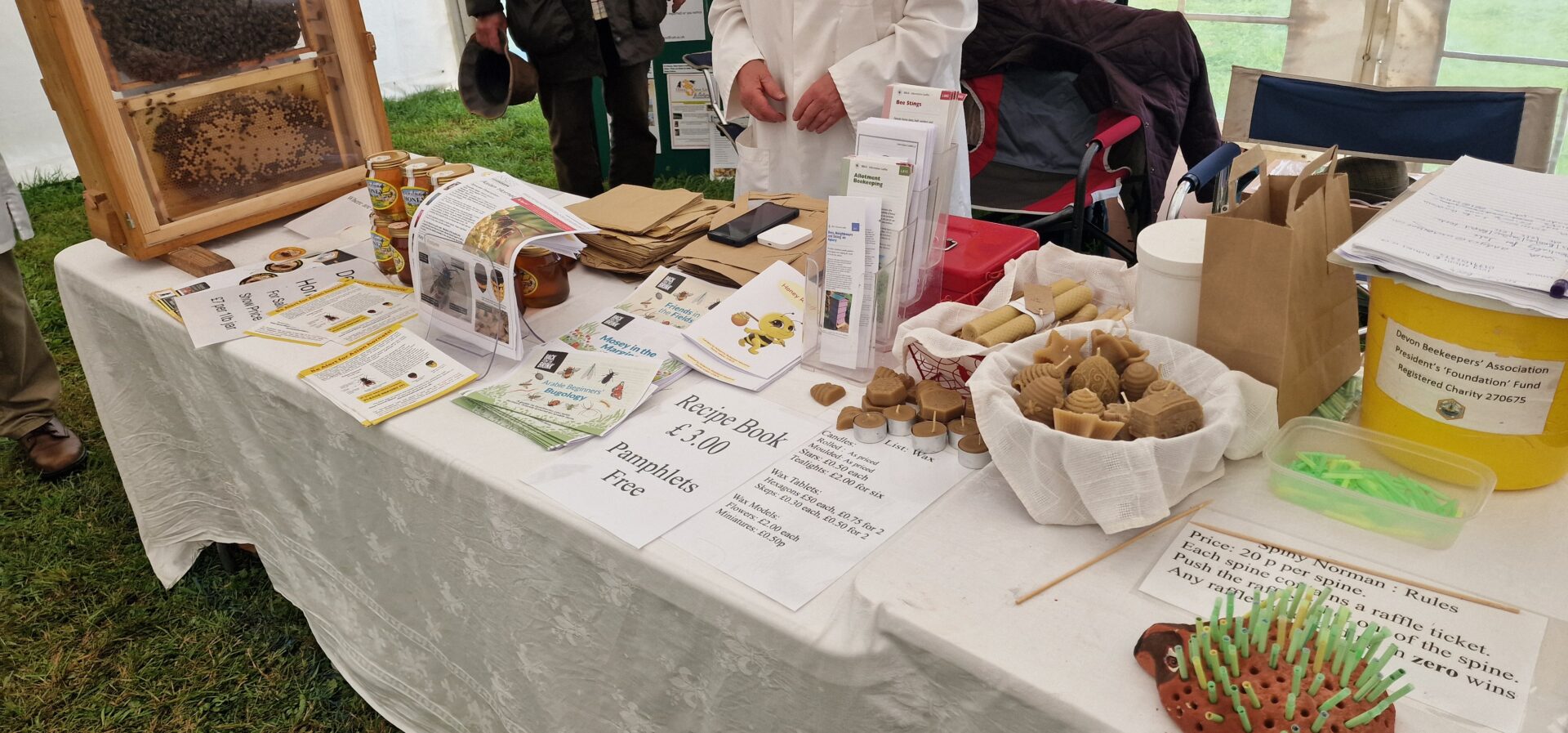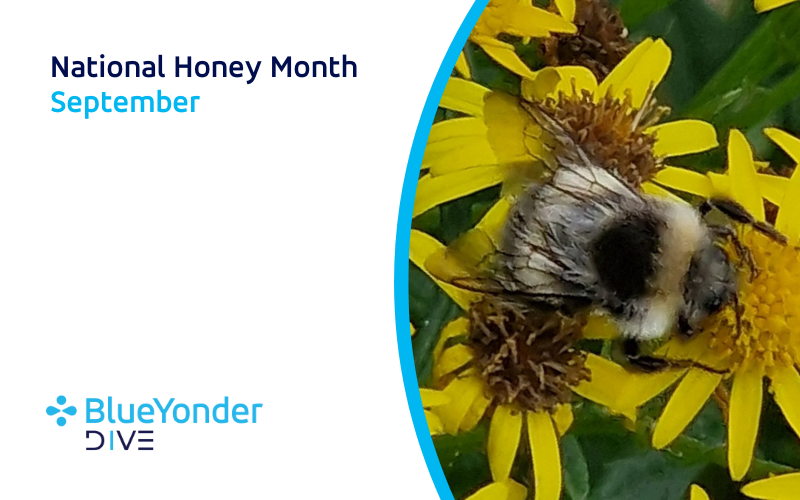What Beekeeping Taught a Blue Yonder Associate About Persistence
September is National Honey Month and Blue Yonder associate Fred Hoare shares his journey to becoming a beekeeper – and his lessons learned. If you love honey, you won’t want to miss reading his sweet story.
At Blue Yonder we’re very fortunate to be given time off for volunteer work. This year I used some of my Volunteer Time Off (VTO)* to help my local beekeeping club run an educational stall at the local agricultural show. Our aim was to help educate people about bees and other pollinators and how they help the environment, as well as some of the predators and other dangers they face.
Our stand had an observation beehive available. It is a small hive especially constructed with clear plastic sides so that you can see what the bees are doing. It was great fun for people to look and see if they could find the queen bee – she is bigger than all the other bees and we had made it a bit easier to find her by painting a red dot on her abdomen (please don’t worry, having the dot does not harm them but is really helpful as it makes it easier for the beekeeper to find the queen when inspecting a hive to ensure she is still in good health).

When talking to people about bees most think about honeybees and bumblebees but there are many different types of bees; in fact, there are over 20,000 grouped into seven different families. People also think of hives with thousands of bees and lots of honey. The reality is that many types of bees are solitary bees living by themselves or bees that live with a small number of other bees. A honeybee colony will typically have around 50,000-60,000 bees living in it during the summer months. By contrast bumblebees live in colonies with around 200 bees while mason, carpenter, mining and leafcutter bees are solitary with each female making their own nest. The other thing people don’t realize is that many bees, including several types of bumblebees, actually make their nest in the ground.
We also explained to people how important it is that we look after the environment around us to ensure that we have pollinators and that they can do the very important job they need to. Bees and other pollinators like wasps, hover flies, moths, butterflies and several species of beetles play an important part in the world around us. The insects and beetles use pollen as a food source (pollen is roughly 40% carbohydrate and 35% protein) and in collecting the pollen will fertilize the plants and crops. Without them, many flowering plants and food crops would not survive. Can you imagine a world without beautiful flowers, delicious fruits and vegetables or nuts?
If you are like me, one of the ways to help pollinators is to keep your own bees! I’ve been wanting to keep bees for over 20 years (mainly because I love honey) but it was only just over two years ago that I got my first hives. I started by joining my local beekeeping club as they run a beekeeping course and was lucky enough to have someone wanting to sell two established hives. So, I jumped right in and have been on an amazing learning journey ever since. Since then, I have expanded to 20 hives.

You might think keeping bees is an easy job – after all bees have been around making honey for thousands of years without any help from humans. The reality of it is if you want your bees to be healthy and produce excess honey that you can take from them you need to manage the hive on a regular basis from spring through to autumn. That means inspecting it three to four times a month. This involves opening the hives to check for diseases, pests and the quantity of pollen and honey stored, as well as checking the health of the bees, larvae and in particular the queen, which is the most important element to your hive. And you have to do all of this calmly and quickly so as to cause the bees the least amount of distress possible (they will let you know very quickly if you get that wrong).
You also need to watch for signs that they are thinking of swarming. Swarm management is one of the hardest things to get right. When a hive swarms, roughly half the bees will leave with the queen to go and find a new home. The remaining bees will rear a new queen who will then start to rebuild the colony to full size. From a beekeeper’s perspective that usually means very little or nohoney will be produced by that hive.
One of the other things beekeepers are very aware of is pests and predators that are harmful to bees. Some pests can be found in the hive feeding on bee larvae or stealing honey, while other predators love the taste of bees and will hover in front of hives catching bees as they fly in and out, so you have to be vigilant and keep an eye out for them.
Is all the hard work worth it? Absolutely. There is nothing better than the taste of pure honey that has not been overly processed and has the taste of the trees and flowers from your local area. Sadly, much of the honey found in supermarkets is blended and designed to be sweet and bland so that it all tastes the same. If you haven’t tried honey direct from a local beekeeper in your area I definitely recommend you do.
What I’ve learned from beekeeping over the past two years is that when it comes to nature and living creatures nothing is predictable so it is important to be persistent and never give up – it takes a lot of observation to understand bees and what is happening in and around the hive to get it just right. The key is to be flexible, change your approach as needed, remain patient and be prepared to learn something new all the time – much like working in supply chain.
If you are curious about keeping your own bees, please join your local beekeeping club – you’ll learn so much and also have a great group who will be able to help and support you on your journey. Just be warned – bees don’t read beekeeping books, so they don’t always do what they are supposed to and if you ask three beekeepers the same question expect to get four different answers.
* Blue Yonder offers two Volunteer Days annually, and associates are encouraged to utilize these days to support meaningful causes of their choice.

